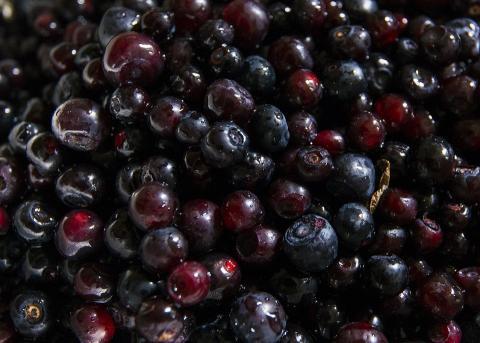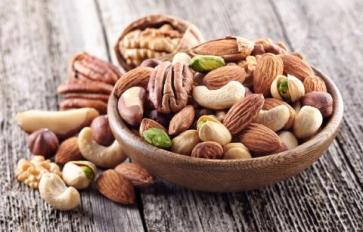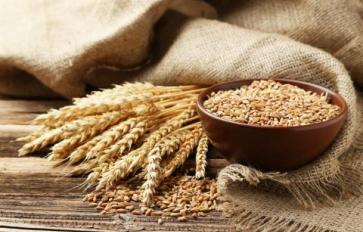
The huckleberry is a member of the Ericaceae family, also known as the Heath family. The genus contains eight species and the plant is native to North America, from Ontario and Minnesota south to Louisiana, and east to the Atlantic coast. The huckleberry has been an essential food for the Native Peoples who stripped the huckleberry bushes of the fruit with rakes made from salmon backbones. They dried the berries in the sun or smoked and mashed them into cakes and wrapped them in leaves or bark for storage. The animals that inhabited the continent relied on the huckleberry as do the current wildlife. Those who venture into the wilderness to pick huckleberries should be aware that they are the favorite food of bears. The name huckleberry is a mistaken identity of the Hart’s berry whose name was corrupted to hurtleberry. Today the huckleberry is also known as the bilberry. It can be cultivated in a home garden to make this versatile plant readily available.
The huckleberry plant grows as a shrub approximately two to five feet with round berries that look very similar to blueberries, growing in colors that can be blue or black; the fruit is very juicy with a sweeter flavor than blueberries. The leaves have sparkling, gold spots on the underside and the blooms are bell-shaped. The plant flowers in late May and bears fruit from June through August, depending on the region. In the northern areas it grows in wet, sandy soil, and in southern regions it can grow in dry or moist sand. Though a drupe traditionally has one hard seed the huckleberry is technically considered a drupe because it contains ten stony seeds making the texture of the fruit crunchy. Huckleberries are a primary flavoring agent in the manufacture of juices, teas, soups, pies, pancakes, and jams. The plant is highly nutritious, containing vitamins A and C, iron, calcium, and traces of protein, which makes it a valuable healing agent.
Listed below are interesting facts about huckleberries, including some of their awesome health benefits!
1. Huckleberries are an essential food for wildlife. Songbirds, grouse, quail, turkey, small mammals, and bears eat the fruit. Deer browse the foliage and twigs. Butterflies find them an excellent host plant for their larvae and bees gather their nectar while serving as pollinating agents.
2. Because they are high in vitamin C content, huckleberries are a valuable food to add to the diet. They help boost the immune system and thus fight infection and disease. Vitamin C is an antioxidant that protects cells from the damage produced by free radicals. It reduces the aging of the skin and helps to digest starch. Huckleberries are found to reduce the risk of heart and ocular diseases.
3. Huckleberries are a good source of vitamin B that supports and maintains the metabolic rate, keeps the muscular system in tone, and also aids in healthy skin. It promotes healthy function of the immune system as well as cellular health. It is an excellent food to prevent the development of pancreatic cancer.
4. For a healthy circulatory system, huckleberries have been used for treating angina, varicose veins, and thrombosis. Huckleberries keep the blood flowing to the heart by maintaining healthy blood vessels. They clean the plaque and prevent its accumulation on the walls of blood vessels, thus reducing the risk of developing atherosclerosis.
5. Huckleberries are considered a superfood because they reduce the risk of developing many diseases and maladies like ocular diseases, oral diseases, diabetes, coronary diseases, arthritis, and Crohn’s disease, to name a few. Huckleberries are effective for promoting female reproductive health and the health of the circulatory system.
The huckleberry is a member of the heath family and is known today as bilberry. The plant is native to North America and was an essential food for both the Native Peoples and the wildlife of the continent. It looks very much like a blueberry but is slightly smaller, sweeter, and juicier and can be used in many recipes. It is a rich source of vitamins A and B, which makes huckleberry very effective in preventing many diseases. Huckleberries can be dried and frozen for storage, made into a juice, and used in many recipes.








